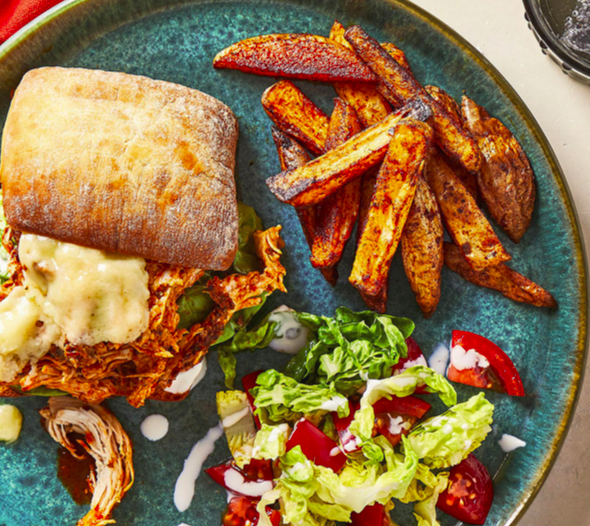
Start your week with achievable workout ideas, health tips and wellbeing advice in your inbox.
You are now subscribed
Your newsletter sign-up was successful
Emotional eating whereby we snack and 'eat our feelings' during times of stress like lockdown is not surprising. We asked health and mindfulness coach Louise Murray to explain more about emotional eating, why we get cravings and how to overcome them.
“Learning to listen to your body and the clues your body is giving you is a vital part of health and wellbeing,” explains Louise Murray. “Rather than viewing cravings as weaknesses, we should instead see them as important messages from our body meant to help us maintain balance.
“This actually provides a more compassionate approach to cravings… which are usually demonised as being inherently ‘bad’.
“Having cravings isn’t a bad thing. In fact, they are sometimes a good indication that you’re not getting the nourishment you’re seeking, which may actually not have anything to do with food! And this is why during lockdown we might experience more cravings than normal - because of how we are feeling mentally and emotionally, due to changes in your routine, behaviour and surroundings.”
What would happen if we re-framed cravings in a positive way?
“When you experience a craving, instead of feeling negative about it or trying to ignore it, what if we instead thanked our body for doing its job and giving us this important message, and then tried to unravel and deconstruct it?” suggests Louise. “Ask yourself, What is my body trying to tell me?”
“Cravings are something we all experience from time to time – so how can we listen to what our body is trying to tell us and use cravings to our advantage?
Start your week with achievable workout ideas, health tips and wellbeing advice in your inbox.
“Here are my top tips for deconstructing cravings and exploring what our body might be trying to tell us…
Cravings aren't just about food
“Firstly, its really important to appreciate that a craving might be a message from your body that it’s seeking a particular food to promote health and wellbeing (e.g. craving nourishing soups when you’re not feeling well), but cravings can also be precipitated by your emotional state, physiological state, diet, routine, or even your surroundings.
“When cravings arise, they can be a symptom indicating an imbalance occurring elsewhere – investigating cravings is a great opportunity to treat the cause, not the symptom. A great opportunity to dig deeper and understand the ‘why’ behind the craving for something sweet or carb loaded.
“Being aware of the different factors that may contribute to cravings can help you explore the choices that are best for you – if that’s eating some ice cream, that’s great; if that’s opting for carrot sticks, that’s also great. Maybe it’s even setting aside time to unwind, which after some investigation, you might learn is what your body ultimately is seeking.”

Acknowledge the cravings
“If cravings arise, acknowledge them and give them space,” says Louise. “Ignoring cravings often makes them seem stronger and more powerful. When you make foods you want off-limits, it usually has the opposite effect.
“Rather than leading you to forget the ‘off-limit’ foods, you end up preoccupied and less equipped to control yourself when you’re around them.
“In this case, mindfully acknowledging and fulfilling a craving may be more productive than actively trying to avoid it. The simple act of acknowledging your craving also may help reduce its power and allow you to dissociate from it.”
Explore the origin with (non-judgemental) curiosity
Louise says: “It is a complex area, and there are many other factors that could be involved such as hormonal fluctuations, whether you exercised the day before or not, whether you are getting enough of certain nutrients, seasonal change, and even if you are feeling satisfied in your career or relationship!
“There are many causes that can make navigating cravings seem tricky, however, gaining a deeper understanding of how cravings work allows you to mindfully respond to your bio-individual cravings.
“In exploring the origin of your cravings, you may want to ask yourself the following questions:
Is this craving occurring alongside a particular emotion or physical feeling?
“Stress, fatigue, loneliness, and even boredom can lead to particular food cravings. In these cases, food won’t solve the problem – it would be treating a symptom, which works in the short-term but probably isn’t in your best interest in the long-term.
“Making this distinction can be an empowering feeling. It allows you to pinpoint and treat the actual cause, which is likely to promote the balance you’re seeking. Although there are many physical and emotional feelings that may lead you to crave particular foods, fatigue and stress are most common.
“When people are tired, they not only eat more but are also more likely to make poor dietary choices. Sleep-deprived individuals are more likely to crave snacks and consume more calories over the course of the day. Lack of sleep has been shown to increase cravings for calorie dense foods.
“The more stressed people are, the more they tend to look for comfort in food – this is just one of the ways that stress leads to weight gain. During stressful times, cravings for energy-dense, less nutritious foods are common. Including an activity that helps you manage stress efficiently can have a major impact on your dietary choices.
Is this craving for a highly palatable food?
“In order to make an empowered choice about foods, it’s important to know that certain foods – called ‘highly palatable foods’ – are designed to be craved. Of course, it’s fine to enjoy these foods, but part of being empowered in navigating your cravings is being aware of the power that some of these foods may hold.
“If it feels like you’re craving sugar, you may be seeking a quick source of energy (it could actually be another symptom of lack of sleep), but research has shown that the more sugar people consume, the more they prefer it. In a way, you build up a tolerance to sugar – requiring you to seek out more concentrated sources or consume larger amounts to create the same pleasurable eating experience that it originally produced.
“Processed foods are designed to make consumers crave them. In fact, the food industry created what has been described as the ‘bliss point’ – the perfect combination of sugar, salt, and fat that makes processed foods difficult to resist.
“Frequent exposure to these types of foods is likely to increase desire for them. These craved foods tend to be higher in calories and fat and lower in protein and fibre – they usually don’t offer a ton of nutritional value aside from energy.
Is this craving tied to a habit?
“Sometimes people simply desire a food or snack because they’re used to having it at a certain time or place. In other words, you may gravitate towards a particular food out of routine. For example, it’s common for people to feel a drop of energy in the late afternoon and reach for sugary snacks or drinks. Eventually, you may start craving snacks during this time of day simply out of habit.
“Rather than going on autopilot, take a moment to tune in to your body. A brief moment of mindfulness may be enough to help you distinguish between craving something out of habit versus craving due to actual hunger or a desire to mindfully and intentionally enjoy a particular food.
Is this craving guiding me toward a food that would support my health or wellbeing?
“Have you ever taken a trip where you enjoyed frequently dining out and eating rich foods and then come home and craved something highly nourishing, like a big salad with tons of fresh, colourful vegetables? This is your body’s attempt to return to balance.
“Fulfilling a craving may also contribute to your well-being beyond a nutritional standpoint. For example, craving a piece of cake to enjoy among friends and family might provide a strong feeling of connection and love. This may be a powerful form of emotional nourishment for some.
Cravings often inside coming out
“These come from foods you’ve recently eaten or foods from your childhood. Recently eaten foods tend to be fresh in your mind, so you’re more likely to crave that food in an attempt to re-create a positive eating experience.
“Similarly, when you crave foods from your childhood, you may really be seeking the feeling of comfort those foods may have provided when you were younger.

Proceed from a place of empowerment
“Once you acknowledge your craving and determine its origin, you give yourself the power to dis-identify with it and determine how to proceed in a way that is best for you,”explains Louise. “Listen to what your body is telling you and enjoy exploring the deeper message that may exist in some of your cravings.
“Rather than feeling controlled by cravings, the empowered approach allows you to be a curious investigator seeking out the best choice for you at the time – don’t forget we’re always changing.
“Consider cravings as a yardstick to determine if things are out of balance. Whether food will ease that craving or if there’s another form of nourishment your body is seeking that comes from off your plate, respect and acknowledge your bio-individual cravings as they come up.
“Remember, your body loves you unconditionally and does everything it can to keep you alive and functioning. You can deprive it of sleep, but it will still get you up and running the next morning. You can drink too much alcohol, and it will still process it through your system.
“Next time you experience a craving, try to think of your body as a crying baby who needs tenderness and love. The baby can’t talk, so it’s up to you to respond with love and compassion and try to figure out what’s wrong. That’s the first step to building a mutually loving relationship.”
Launched in 2020, Fit&Well.com is all about helping you meet your health and fitness goals in ways that are fun and achievable. With news and features on fitness, weight loss, running, nutrition, yoga, wellness and more, we're committed to helping you wherever you are on your fitness journey. We break down the best fitness tech, with reviews, buying guides and the latest deals on fitness and wellness kit, from dumbbells to diffusers.
We cater for all difficulty levels here. It doesn't matter if you're a beginner in the world of fitness or you're gearing up for your tenth marathon: we're all moving towards the same goal – creating a healthier, happier you. From guides on getting started doing walks around the block, to creating the perfect work-from-home space, to eating to fuel your first triathlon. It's all here.

